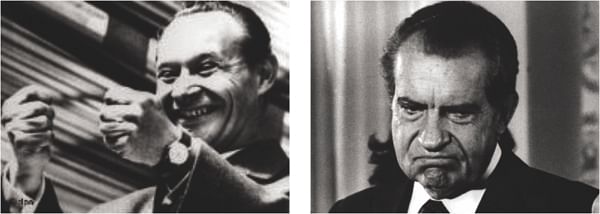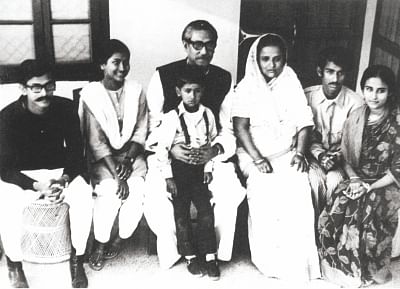| Home - Back Issues - The Team - Contact Us |
 |
| Volume 10 |Issue 30 | August 05, 2011 | |
|
|
Musings In the month of August . . . Syed Badrul Ahsan The month of August resonates in the collective memory. You step into it with that sure sense of history you think has always defined the character of the month. Every time it comes around, you think back on the tens of thousands who died in Hiroshima and Nagasaki in 1945. Those dead were part of the nuclear experiment US President Harry Truman and his military wished to carry out as a demonstration of their newfound power in the global arena. It was not Japan they wanted to bring to heel, for Japan was already headed for surrender. To this day, the horror unleashed on Hiroshima and Nagasaki remains a scandal, a crime for which Truman and his administration were never called to account. If August is a reminder of the dead and the maimed in Japan, it is also a harking back to the promise that was Indonesia, when Ahmed Sukarno made it clear that his nation wished to be free of the Dutch colonialism which had kept the people of that beautiful country in a state of dark siege. Sukarno belonged to that idealistic band of men who in the 1940s went out on a limb to free their peoples of foreign domination. In August 1945, even as the Japanese surrendered to the Americans, Netaji Subhas Chandra Bose issued his final order of the day as head of the free Indian government he had forged in exile. And then he disappeared without trace. There are those who believe he died in a plane crash. Quite a few others think he must have lived, unable to communicate with his people. Netaji's death or disappearance was a blow to India, to its unity. Had he lived, the tragedy which was to engulf India barely two years after his disappearance may well not have come to pass.
August is forever etched in the consciousness of people whose forefathers experienced the furious politics of 1940s' India. The Great Calcutta Killings, which began on 16 August 1946 with the announcement of the day by the Muslim League as a so-called Direct Action Day, led to the massacre of a million Hindus and Muslims. Hundreds of years of fraternal existence, of shared heritage in villages and towns, by these religious communities, were simply blown away by the parochialism of men stubborn about putting a knife through centuries of rich cultural tradition, through decapitating a whole and wholesome country of struggling and yet heroic courageous men and women yearning to be free of British colonial rule. A year later, in August 1947, men and women died again in bloody fratricide as they left their ancient villages to seek the future in a land now defined in terms of communal belief. A brooding India woke to freedom. A chaotic Pakistan took shape.
In August 1971, the Pakistan military junta, happily presiding over the systematic genocide of Bengalis, put their undisputed elected leader Sheikh Mujibur Rahman on trial in Mianwali. The regime was careful not to have the show trial, for that is what it was, conducted in public. The proceedings were held in camera and not a soul knew how the soldiers were treating the father of a future Bangladesh. It was a charade that would bring down a sentence of death on Bangabandhu, a conviction which fast moving history would soon overturn. In that same month, India and the Soviet Union reached a deal that would advance the Bangladesh cause a long way. Indira Gandhi and Leonid Brezhnev simply left Richard Nixon and Chou En-lai, friends of Pakistan, red in the face. And yet history would take another bad mauling only four years later, with some trigger-happy soldiers in independent Bangladesh shooting down the Father of the Nation and most of his family in August 1975. It was a blow from which none of us has recovered. Every August, for Bengalis, is a long elegy in remembrance of Sheikh Mujibur Rahman. Observe Europe. In August 1968, the Soviet Union committed the grave mistake of leading the Warsaw Pact countries into an invasion of a restive Czechoslovakia. And suddenly the Prague Spring which Alexander Dubcek had inaugurated only months earlier went dead under the weight of all those tanks rolling into the country. Dubcek was hauled, with little decency coming into the act, to Moscow to be given a list of do's and don'ts by the Kremlin. He then returned home, to be soon pushed out in favour of Gustav Husak. Dubcek would not be heard of again, not until the velvet revolution which would bring Vaclav Havel to power in a soon to be broken Czechoslovakia years later. Dubcek became speaker of parliament. And then he died in a car crash. Richard Nixon, unable to sustain his lies and unwilling to go through impeachment, resigned the American presidency in August 1974. General Ziaul Haq of Pakistan was blown to pieces when his C-130 aircraft came crashing down even as the sun prepared to set in Bahawalpur in August 1988. Those who recovered all those human remains aver that the only way they could identify Zia was through a chunk of his face which still sported his moustache. Sounds macabre, but then, it was real. If August sends some of the saddest of notes rushing through our sensibilities, it also holds the capacity to energise us in a reshaping of ancient dreams. Remember Martin Luther King Jr, for he sketched a mammoth dream for his fellow blacks in America in August 1963. 'I have a dream', he intoned. And he then soared, taking dreamers like you and me with him to the heights of grandeur. We liked what we saw. The writer is Editor, Current Affairs,The Daily Star.
Copyright
(R) thedailystar.net 2011 |
||||||

